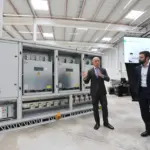The energy sector is taking accelerated steps into a new era, driven by the energy transition and digitalisation. Distribution networks will play a key role in this transformation and the incorporation of digital and predictive technologies brings with it the challenge of cybersecurity. At ZGR we want to be part of the group of leading companies in electrical digitisation and we are taking all the necessary steps to innovate in all its areas. Especially in those that have to do with virtual security.
The energy sector is undergoing a process of change known globally as the energy transition. The need for this transition comes from global warming. And its objective is to transform an energy system based on fossil fuels into one centered on renewable sources to guarantee the sustainability of the planet. But the energy sector, like any other sector of economic and social activity, is also affected by the digital transformation.
The combination of transition and digitalisation are profoundly transforming the energy sector and enhancing the role played by the electricity sector. In this scenario, electricity distribution grids are taking on a special role. These grids are the ones that will enable the rapid integration of distributed renewable sources and, to this end, the help of digitalisation is essential.
The distributed nature of the new renewable sources to be integrated into the grid and the variable nature of their generation require real-time control and monitoring functions. These can be used to achieve efficient operation of the system.
Digitalisation and smart grids
The digitalisation of the electricity sector is leading to smart grids. A smart grid is one that can efficiently integrate the behaviour and actions of all users connected to it in such a way as to secure an energy system:
- sustainable and efficient.
- with low losses.
- high levels of quality and security of supply.
With smart grids, changes and disturbances in the electricity grid can be detected remotely and in real time, and decisions on actions can be made and responded to. It also enables a two-way relationship between the infrastructures themselves and the end user.
But, as with any system that incorporates digital technologies, smart grids face virtual security risks. The incorporation of devices and communication elements into the electricity grid increases the chances that these critical infrastructures can be compromised. It also increases the risks of cyber-attacks and exploitation of vulnerabilities. These risks are also benefit by the wide geographical extension and heterogeneity of grids.
All of this means that concern for cybersecurity has grown exponentially in the electricity sector and that measures and actions tailored to each environment are required. Cybersecurity has become a critical element for the digitalisation of electricity distribution networks.
“As the digitisation of electricity grids progresses and a higher level of remote management is made, it will be necessary to protect communications and provide them with cybersecurity,” says Íñigo Segura, CEO of ZGR.
ZGR contributes to cybersecurity in the electricity sector
At ZGR we are an enabler of new business models through the efficient use of technology in strategic areas of the electricity sector. Therefore, we are committed to the development of solutions for the energy transition towards smart and distributed grids, maximising energy production and grid quality. This commitment generates a commitment to cybersecurity.
And what are we doing about cyber security? Some examples show our actions in this area.
One of them is our participation in the TrueValSec project, which aims to align and foster collaboration between companies to generate new, innovative, verifiable, and scalable cybersecurity technologies. The objective is to build, through collaboration, long-term solutions to meet the business and competitiveness challenges of the electricity sector in the smart grids of the future. In addition to providing innovative cybersecurity technologies.
TrueValSec is a project that is co-funded by the Basque Government through the Hazitek 2021 R&D support programme. The SPRI Group is the programme manager. In this project and others in the program, different entities have been working for months on the development of cybersecurity measures aimed at electronic components that are integrated into a substation. In addition, they are defining procedures adapted to the particular needs of each agent in the chain. The specifications defined contemplate the management of cybersecurity throughout the life cycle of products and equipment linked to the electricity grid.
Identification of vulnerabilities in electrical equipment
On the other hand, we have worked with the National Institute of Cybersecurity (INCIBE) to be one of the bodies that makes the diagnosis and monitoring of vulnerabilities in equipment. ZGR has been authorised as a CNA, a competent body in the designation, publication and disclosure of vulnerabilities affecting its sector and activity. CNA is the most important global network for cooperation in the identification of vulnerabilities and the fight for cyber security.
With this authorisation, we joined the network of 203 CNAs in 32 countries to manage the CVE vulnerability program. In Spain, ZGR is the first company in the energy sector to join and the fourth in all sectors. Our role as a CNA allows us to assign CVE identifiers to the vulnerabilities that are detected and that affect our products.
Finally, we are developing a Cybersecurity Plan to implement the best standards in our own equipment.
The future of electricity relies on intelligence and cybersecurity
For us, today’s smart grids are true data networks and the only possible way to centrally manage the complex power grids of the future.
The possibility of equipping our equipment and devices with processing and communication capabilities to turn them into intelligent systems, which cooperate with each other and operate autonomously, is a breakthrough. In this context, information security requirements are becoming increasingly important, and challenges related to equipment cybersecurity are arising.
At ZGR, we want to make a decisive contribution to the modernisation of the electricity sector. We provide our high level of expertise in technological solutions focused, among other areas, on smart grids and cybersecurity. In addition, we work together with other players in the electricity sector in the development of specific products that incorporate communication and cybersecurity features.
The future will be of distributed electricity grids with renewable generation and their management will only be possible with smart and cyber-secure technologies. ZGR is working to be prepared and to play a leading role in this future.






